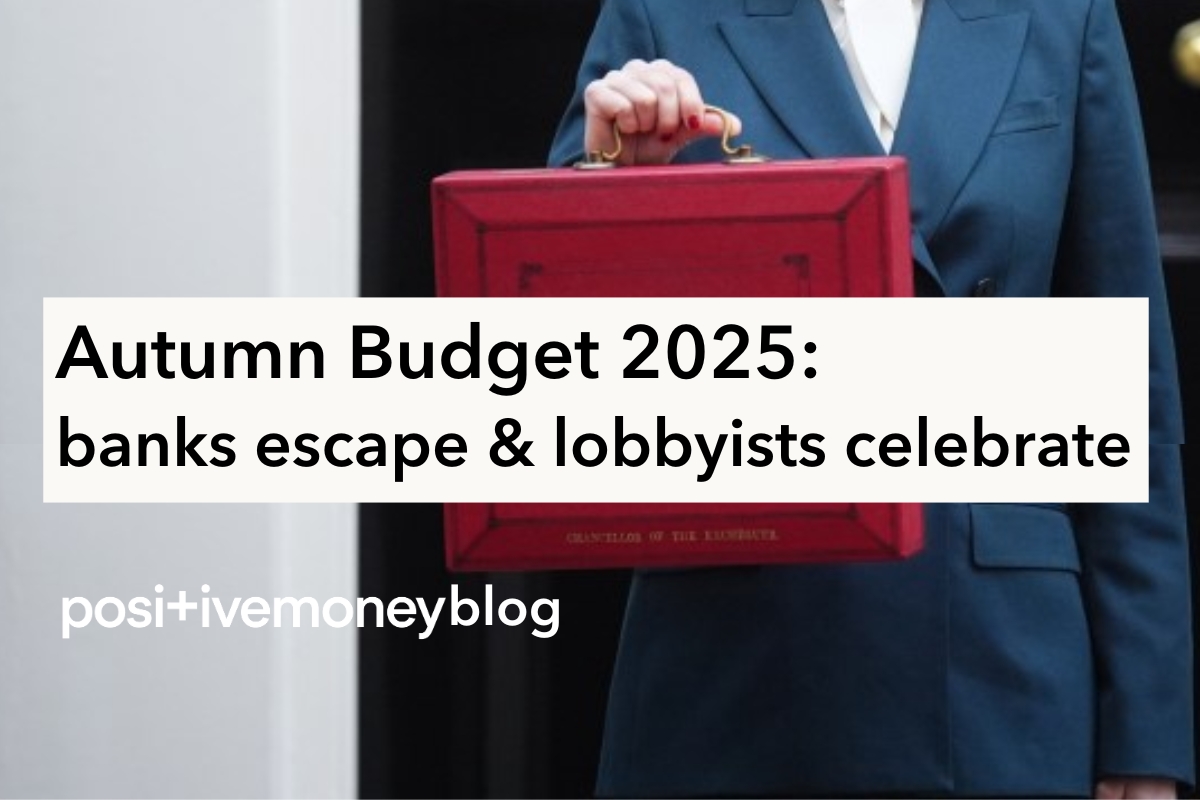
UKEU
18 February 2026
In Chancellor Rachel Reeves’ Budget today, the government chose to spare those with the broadest shoulders - banks - from tax rises, and instead hit the pockets of ordinary taxpayers
After months of speculation, today Rachel Reeves finally presented her Autumn Budget to Parliament. The Budget included a range of measures, some of which - including scrapping the two-child benefit cap, and steps towards fairer taxation of property wealth - are deeply welcome and long overdue. But overall the Budget was a missed opportunity for ambitious measures to reduce inequality and rebalance our economy towards one that prioritises people and planet over profit.
The Chancellor raised taxes to the tune of tens of billions across a wide range of areas. Some of these changes, like raising tax on landlords’ rental income, and increasing the council tax paid by owners of extremely high value properties, are positive steps towards a tax system that could help to make homes more affordable. But despite promising that the budget would raise taxes on those with the ‘broadest shoulders’, the Government failed to introduce a windfall tax to reclaim the huge public handouts being made to the banking sector.
The big four UK banks raked in a record £45.9 billion in profit in 2024, and are on track to beat that in 2025. This is thanks to years of higher interest rates, which have caused profits to skyrocket without banks having to lift a finger. Much of these profits are ultimately being paid by the public, as the Treasury is transferring billions each year to cover the Bank of England’s losses on interest payments and ‘Quantitative Tightening’ - the sale of government bonds that it bought during Quantitative Easing after the financial crisis.
Positive Money’s proposal, for a 38% levy on UK retail banking - in line with the one on energy companies who’ve also benefitted from the cost of living crisis - would’ve brought in over £14 billion from these four banks alone, and it was hugely popular. Polling found 2 in 3 people support a bank windfall tax and nearly 70,000 people signed the petition we delivered to the Chancellor’s front door on Monday. It’s disappointing the government did not stand up to bank lobbyists’ faulty arguments that a windfall tax would reduce growth, when we know that banks are failing to invest in local businesses and green industries, and instead handing billions to shareholders whilst closing vital in-person branch services.
Shares in UK banks NatWest, Lloyds, and Barclays actually increased between 2.3 and 3.8% yesterday - following early reports they were going to be spared from tax rises. While among the £26 billion in rises the Chancellor did announce today, by far the largest chunk has come from freezing income tax thresholds. Pushing 1.7 million people into higher tax brackets or into paying the basic rate for the first time, and raising an estimated £8 billion from ordinary people.
The Chancellor also opted to cut the tax-free allowance for Cash ISAs - from £20,000 to £12,000 - in the face of public opposition, including 45,000+ petition signers. This policy was lobbied for by city executives who argued that the move would boost economic growth by pushing people to move their money into Stocks and Shares ISAs. But pushing more savings into the stock market won’t increase investment in the ‘real’ economy. It’s more likely to provide a short-term boost to stock market values to the benefit of big corporations and their shareholders. The change was postponed following pushback earlier this year - including from building societies and credit unions, for whom Cash ISAs provide a vital funding source. If the Chancellor were serious about addressing savings inequality or rebooting our economy for people and the planet, more ambitious alternatives were available, like introducing an ISA for public purpose, that would better direct investment to the things we really need. However, the intial proposal was to cut the allowance all the way down to £4,000, and an exemption was also made for over 65s, both clear signs of impact all the campaigning on this issue has had.
One very welcome change is the long-awaited reversal of the two-child benefit cap, which has kept nearly three-quarters of a million children locked in poverty. As we made the case for on LBC News yesterday however, the additional £14 billion a windfall tax on bank profits would’ve raised, would have easily covered this four times over.
The government could have introduced more generous measures to fix public services, help with soaring food and energy bills, and to address the housing and climate crises because life doesn’t have to be this hard. Our economic system isn’t a naturally occurring phenomena, people have designed it and it can be redesigned. Whilst we didn't secure higher taxes on banks this time around, following intense lobbying by the sector, we'll continue to push back against the power of big finance.
We’ll continue to analyse all the Budget documents and dig into the details in the coming weeks. Because, as Simon Opher MP who joined us on Monday said, “thousands of members of the public who have signed this petition are calling to make our economy fairer.” And that is exactly what Positive Money will continue the fight to do.
Sign-up to our mailing list for regular updates, or make a donation, to support our work to redesign our economic system for social justice and a liveable planet.
